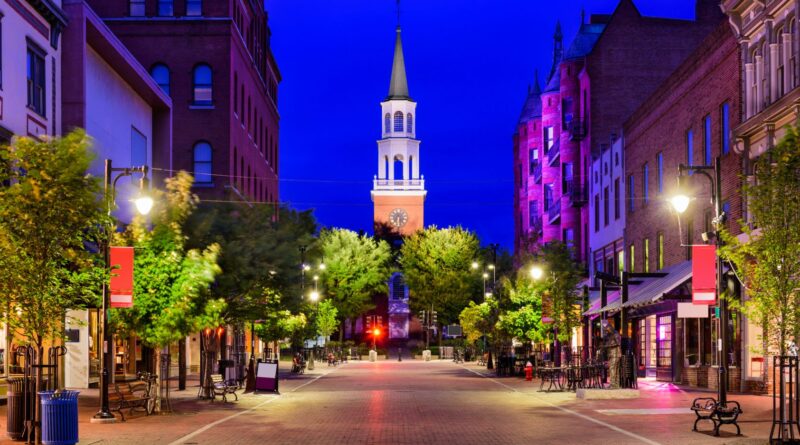History of Burlington Vermont
Nestled along the shimmering eastern shores of Lake Champlain, between the lush Green Mountains of Vermont and the sublime Adirondack Mountains of New York, lies the city of Burlington, a place steeped in a long and captivating history. From its indigenous roots to its role as a modern cultural and educational hub, Burlington has a story that spans thousands of years and interweaves a diverse tapestry of peoples, events, and influences.
The First Inhabitants: The Western Abenaki
Long before European explorers set foot in the region, the fertile lands around what is now Burlington were home to the Western Abenaki, a tribe within the Abenaki nation. These indigenous people called the area Ndakinna, meaning “Our Land,” and lived a semi-nomadic lifestyle intimately tied to the rhythms of nature.
The Western Abenaki hunted and fished in the abundant forests and waterways, cultivated crops like corn and squash, and established seasonal villages along the shores of the great lake they called Pitawbagw (“the lake between the lands”). They developed a rich cultural heritage deeply rooted in respect for the land and its resources.
The French and British Arrivals
In 1609, the first European explorer to gaze upon the shores of Pitawbagw was French navigator Samuel de Champlain. Champlain’s writings introduced the region to the Western world, marking the beginning of a long period of colonial rivalry between France and Great Britain over control of these lands.
Over the next two centuries, the area alternated between French and British rule, serving as a strategic location during conflicts like the French and Indian War and the American Revolutionary War. In 1763, after the French ceded their remaining North American territories, the land fell under permanent British control as part of the province of Quebec.
Founding and Growth of Burlington
It wasn’t until 1783 that the town of Burlington was officially founded by American revolutionary Colonel Stephen C. Pearse. Located on land granted to him and others by the newly independent United States, the new settlement was named in honor of the Burling family, wealthy landowners from the former British province of New York.
In its early years, Burlington grew steadily as a hub for trade and transportation on the lake, with industries like logging, quarrying marble and other stone, and manufacturing establishing footholds. The opening of the Champlain Canal in 1823 and the arrival of the railroad in the 1840s were major catalysts for economic development, linking Burlington to wider markets.
Birth of a College Town
While commerce fueled Burlington’s early growth, the establishment of the University of Vermont in 1791 planted the seeds for the city’s future as an intellectual and cultural center. Founded through land grants from the same revolutionary statesmen who established Burlington itself, UVM was one of the first public universities founded in the newly independent United States.
The university’s presence gave rise to a spirit of inquiry, learning, and cultural exploration that has permeated Burlington’s character ever since. Over the centuries, UVM has educated generations of scholars, writers, artists, scientists, and leaders, contributing immensely to the city’s vibrancy and national reputation.
From Industrial Hub to Arts and Recreation Mecca
The 19th and early 20th centuries saw Burlington transition from a commercial shipping town into a diversified industrial powerhouse. Factories produced everything from woolens and machinery to brushes and carriages. Major employers like the Burlington Cotton Mills, E.B. & A.C. Whiting Company (firearms), and Burlington Brush Company anchored the city’s prosperity.
As the 20th century progressed, however, Burlington evolved in new directions. While manufacturing remained important, the city embraced its natural setting on the lake and mountains to emerge as a destination for outdoor recreation and environmental conservation. The local food movement took root, showcasing Vermont’s agricultural bounty through farm-to-table cuisine.
Perhaps the greatest transformation came in the cultural realm. In the 1960s and 1970s, Burlington embraced its status as a college town, becoming a hub for counterculture movements and progressive politics. The renowned Burlington Waterfront redevelopment in the 1980s and 1990s revitalized the downtown, creating public spaces for arts, music, and community gatherings.
Today’s Burlington: Where History Meets Modern Vibrancy
In the 21st century, Burlington stands as a shining example of a modern city that has successfully interwoven its rich history and heritage into an innovative, forward-looking spirit. Historic buildings house chic boutiques, farm-fresh eateries, and cutting-edge businesses, while the university continues to attract scholars and creatives from around the world.
The quaint Church Street Marketplace, with its vintage architecture and car-free thoroughfare, anchors a lively downtown where street performers, artists, and musicians enliven the pedestrian experience. Annual events like the Vermont Brewers Festival and the Jazz and Harvest Festivals celebrate Burlington’s zest for craft beverages, music, and local culture.
Meanwhile, the city’s indigenous heritage is honored through efforts toward reconciliation, like the celebration of Western Abenaki traditions and the recent movement to recognize a Western Abenaki place name alongside the official “Burlington.”
With easy access to the great outdoors through parks, trails, and Lake Champlain itself, Burlington offers an enviable quality of life that attracts residents, visitors, and new businesses alike. This unique convergence of history, education, culture, recreation, and modernity is what makes Burlington, Vermont such a captivating and distinctive city in the 21st century.
Discover more from City Towner
Subscribe to get the latest posts sent to your email.




